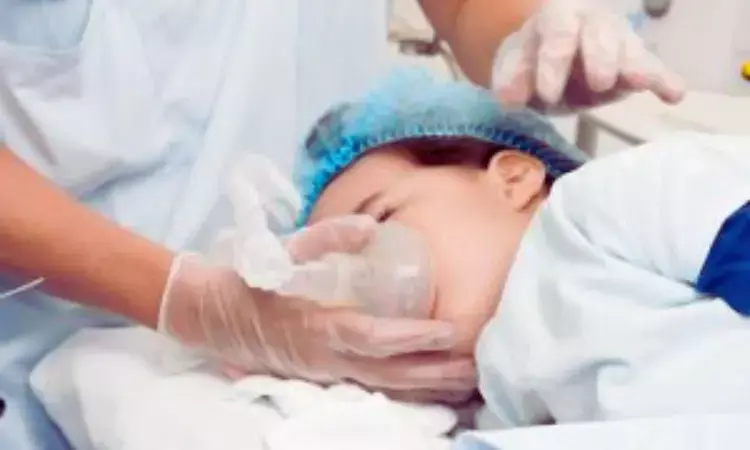- Home
- Medical news & Guidelines
- Anesthesiology
- Cardiology and CTVS
- Critical Care
- Dentistry
- Dermatology
- Diabetes and Endocrinology
- ENT
- Gastroenterology
- Medicine
- Nephrology
- Neurology
- Obstretics-Gynaecology
- Oncology
- Ophthalmology
- Orthopaedics
- Pediatrics-Neonatology
- Psychiatry
- Pulmonology
- Radiology
- Surgery
- Urology
- Laboratory Medicine
- Diet
- Nursing
- Paramedical
- Physiotherapy
- Health news
- Fact Check
- Bone Health Fact Check
- Brain Health Fact Check
- Cancer Related Fact Check
- Child Care Fact Check
- Dental and oral health fact check
- Diabetes and metabolic health fact check
- Diet and Nutrition Fact Check
- Eye and ENT Care Fact Check
- Fitness fact check
- Gut health fact check
- Heart health fact check
- Kidney health fact check
- Medical education fact check
- Men's health fact check
- Respiratory fact check
- Skin and hair care fact check
- Vaccine and Immunization fact check
- Women's health fact check
- AYUSH
- State News
- Andaman and Nicobar Islands
- Andhra Pradesh
- Arunachal Pradesh
- Assam
- Bihar
- Chandigarh
- Chattisgarh
- Dadra and Nagar Haveli
- Daman and Diu
- Delhi
- Goa
- Gujarat
- Haryana
- Himachal Pradesh
- Jammu & Kashmir
- Jharkhand
- Karnataka
- Kerala
- Ladakh
- Lakshadweep
- Madhya Pradesh
- Maharashtra
- Manipur
- Meghalaya
- Mizoram
- Nagaland
- Odisha
- Puducherry
- Punjab
- Rajasthan
- Sikkim
- Tamil Nadu
- Telangana
- Tripura
- Uttar Pradesh
- Uttrakhand
- West Bengal
- Medical Education
- Industry
Reevaluating Preoperative Fasting in Children: Review Provides Insights on Guidelines, Aspiration Risks, and Safety Measures

Sweden: A recent review published in Best Practice & Research Clinical Anaesthesiology has highlighted the evolution of recommendations and guidelines regarding preoperative fasting in children and the supporting evidence behind these changes.
The review by Peter Frykholm, Uppsala Centre for Paediatric Anaesthesia and Intensive Care Research, Uppsala University Hospital, Uppsala, Sweden, and colleagues explores the development of preoperative fasting guidelines and evaluate the incidence of pulmonary aspiration of gastric contents, along with recommended treatment approaches.
Since 1994, nine guidelines developed by professional societies and published in peer-reviewed journals have been identified regarding preoperative fasting in pediatric anesthesia. Over the past three decades, recommendations for fasting across various categories have seen only minor adjustments.
The review also identified twelve studies on the incidence of pulmonary aspiration, reporting rates ranging from 0.6 to 12 cases per 10,000 anesthetics in children. This variation is influenced by differing definitions of aspiration and variations in study design. Key risk factors associated with pulmonary aspiration include emergency surgery, ASA physical status, and patient age. Additionally, non-compliance with fasting guidelines has been noted as a potential risk factor.
Interestingly, the duration of fasting from clear fluids does not appear to be linked to an increased risk of pulmonary aspiration, suggesting that this finding may inform future updates to guidelines in pediatric anesthesia.
According to the research, the following were the practice points:
- Low Mortality Risk: Pulmonary aspiration of gastric contents in healthy children does not result in mortality.
- Declining Incidence: The rate of aspiration requiring escalation of care or intensive care has decreased significantly over the past 30 years, by one order of magnitude.
- Clear Fluid Safety: Aspiration of clear fluids consumed before anesthesia has not been linked to significant morbidity or mortality.
- Risk Factor Identification: Identifying patients with aspiration risk factors and adjusting the airway management plan accordingly may be the most effective strategy to prevent pulmonary aspiration.
- Immediate Response: Prompt recognition and management of regurgitation during all phases of anesthesia—induction, maintenance, and emergence—are crucial for minimizing potential harm to patients.
The study revealed that pulmonary aspiration of clear gastric contents in children is rare and typically does not result in complications. Over the past 50 years, only two reported cases have linked aspiration to fatalities. The incidence of pulmonary aspiration requiring postoperative intensive care has significantly decreased, now ranging from 0.2 to 3 cases per 10,000 anesthetics, marking a reduction of one order of magnitude. Similarly, instances of aspiration that necessitate escalated care—such as unplanned admissions, supplemental oxygen beyond the post-anesthesia care unit (PACU), or antibiotic treatment—have also declined, with reported rates between 0.4 and 3 cases per 10,000.
Furthermore, regurgitation leading to transient symptoms, including intraoperative desaturation, coughing, or the need for suctioning of regurgitated gastric contents, occurs at an incidence of 0.6 to 10 cases per 10,000.
While preoperative fasting for solids remains critical, recent findings suggest that clear fluids can be consumed closer to induction than previously recommended. Introducing new fasting guidelines, which advocate for a one-hour limit on clear fluid intake, is safe and effective in minimizing fasting durations.
"Nevertheless, even with adherence to fasting guidelines, ensuring a completely empty stomach in pediatric patients remains uncertain. Therefore, the anesthesia team must remain vigilant regarding the risk factors associated with aspiration, recognizing that clear fluid fasting duration does not appear to be one of them. Prompt identification and management of regurgitation during all phases of anesthesia—induction, maintenance, and emergence—are essential to mitigate potential patient harm," the researchers concluded.
Reference:
Frykholm, P., Hansen, T. G., & Engelhardt, T. (2024). Preoperative fasting in children. The evolution of recommendations and guidelines, and the underlying evidence. Best Practice & Research Clinical Anaesthesiology, 38(2), 103-110. https://doi.org/10.1016/j.bpa.2024.03.003
Dr Kamal Kant Kohli-MBBS, DTCD- a chest specialist with more than 30 years of practice and a flair for writing clinical articles, Dr Kamal Kant Kohli joined Medical Dialogues as a Chief Editor of Medical News. Besides writing articles, as an editor, he proofreads and verifies all the medical content published on Medical Dialogues including those coming from journals, studies,medical conferences,guidelines etc. Email: drkohli@medicaldialogues.in. Contact no. 011-43720751


